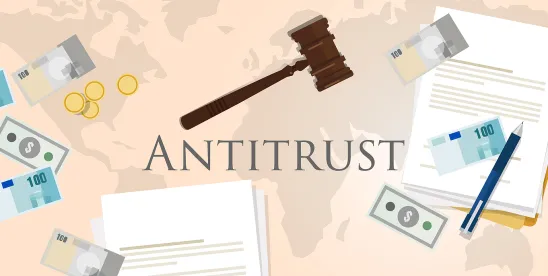With the US Department of Justice (DOJ) and Federal Trade Commission (FTC) withdrawing yet another set of antitrust compliance guidelines last month, companies that collaborate with their competitors — whether directly or through a trade association — are left without any official agency guidance regarding safe harbors, other than the murkier background of a century of antitrust cases. However, the forthcoming change in presidential administrations might provide increased clarity.
The DOJ and FTC in 2023 had earlier withdrawn the decades-old safe harbors for information sharing among competitors, which many companies and associations relied on to tailor their data analytics. Our alert regarding that withdrawal is available here.
The agencies followed up by jointly announcing on December 11, 2024, their withdrawal of the Antitrust Guidelines for Collaborations Among Competitors (Collaboration Guidelines). The FTC announced the withdrawal of the 24-year-old Collaboration Guidelines following a narrow 3-2 party-line vote. The three Democratic commissioners supported withdrawal, while the two Republican commissioners opposed it.
The Guidelines Are Gone
The Collaboration Guidelines provided detailed guidance about US federal antitrust enforcers’ advice to companies for antitrust compliance when collaborating with competitors. According to the FTC’s press release, the 2000 Collaboration Guidelines “no longer provide reliable guidance about how enforcers assess the legality of collaborations involving competitors.” Instead, the DOJ and FTC encourage businesses thinking about partnering with competitors to “review the relevant statutes and caselaw to assess whether a collaboration would violate the law.”
The Dissents May Portend a Trump Administration Action Item
The FTC’s Republican Commissioners Melissa Holyoak and Andrew Ferguson, who likely will be the next FTC chairperson, strongly criticized the withdrawal of the Collaboration Guidelines, arguing in their dissents that the decision was terribly timed and will leave companies without clear guidance:
Improper Timing
- They both argued that it was inappropriate for the Commission to make this decision during the lame-duck presidential period, “a mere 40 days before the country inaugurates a new President,” “further compounding today’s poor policy decision.”
- Commissioner Ferguson’s dissent indicated that although the FTC seeks to promote “transparency and predictability,” now is not the time to “withdraw existing guidance or to push through revised or new guidance.” Instead, the time left for the Biden-Harris Commission should be reserved to “facilitate an orderly transition.”
- Commissioner Holyoak’s dissent conveyed her opposition to the Commission’s decision, stating “The Majority had four years to address its concerns with the Collaboration Guidelines — now is not the time.”
Unclear Guidance
- Commissioner Holyoak further expressed her opposition to the withdrawal, stating that the withdrawal announcement happened “without providing any replacement guidance, or even intimating plans for future replacement.” She contended that withdrawal of the Collaboration Guidelines leaves “businesses grasping in the dark.”
- Commissioner Ferguson stated the Commission should “revisit its nonbinding guidance to ensure that it properly informs the public of the Commission’s enforcement position” which may become evident with the next Administration.
In response to Commissioners Ferguson and Holyoak, Commissioner Alvaro Bedoya, writing for the majority, wrote that the FTC is “not on vacation,” emphasizing that “[t]he American people expect their government to keep working for them even in periods of transition.” Commissioner Bedoya further asserted that he looks forward to working with the incoming Trump Administration with “evolving jurisprudence on competitor collaborations and issue new guidance for the business community.”
What Is Next?
For now, companies should no longer rely on the Collaboration Guidelines and instead must look for guidance in the underlying caselaw that the DOJ and FTC’s guidelines were based upon.
Yet, given the anticipated appointment of Commissioner Ferguson as the next FTC chairperson and his dissenting comments, the incoming Trump Administration might seize the opportunity to revisit the Collaboration Guidelines.
Barring that change in position, as Commissioner Melissa Holyoak indicated, companies will need “antitrust lawyers on speed dial” to obtain specific guidance to navigate case-by-case situations and evaluate the nuances of each project’s antitrust compliance.





 />i
/>i
